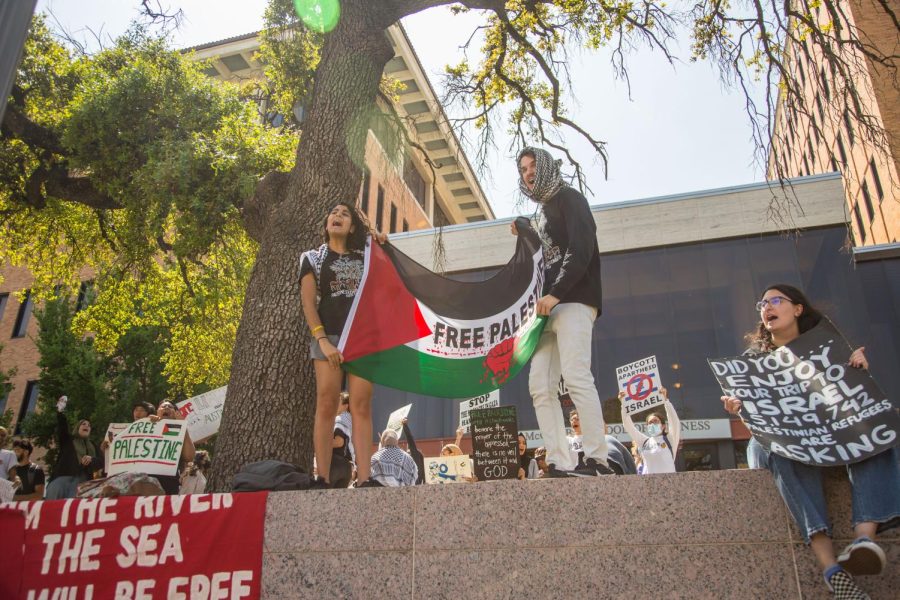Palestine Solidarity Committee protests during Israel Block Party
Members of Palestine Solidarity Committee hold signs and banners during a protest against the Israeli Block Party event on April 5, 2022. Protesters gathered near the McCombs School of Business across the street on Speedway from the Israeli Block Party event.
April 5, 2022
The Israel Block Party, an event that celebrates Israeli culture, took place in front of Gregory Gym this Tuesday. Simultaneously, across Speedway by the McCombs School of Business, the UT Palestine Solidarity Committee protested the party.
“From the river to the sea, Palestine will be free,” chanted protestors.
The PSC said they protested the party because it portrays Israel as a fun, equal opportunity country when it was built on the oppression of Palestinians, according to an Instagram post from the group. Israel Block Party is funded by Texas Hillel, the UT Jewish student center, and is an annual event that has been held for over 20 years, but this year marks the first time it has been held since the pandemic.
The event had Israeli pop music, camels and a celebration tent to promote the food, culture, religion and heritage of Israel.
Maiya Edelson, executive director of Texas Hillel, stated in an email that the event is meant to showcase the diversity and experiences of all people of Israel, including Jewish, Arab and Christian citizens.
In previous years, the IBP hosted a booth for the Israeli Defense Forces, despite criticism that doing so propagates a pro-occupation agenda. This year, the booths only pertained to food, music and culture, with an open student-led discussion zone.
Members of Texas Hillel declined to comment in regards to the PSC protest.
The protest took place following North America’s International Apartheid Week to bring attention to the misrepresentation of conditions in Israel, said Haya, a member of PSC who asked to only be identified by her first name for safety reasons. Protesters wore traditional keffiyeh scarves as they chanted.
“There’s a lot of cultural appropriation,” Haya said. “(The Block Party) is essentially a form of propaganda in order to make Israel look like this welcoming, happy place when we, as Palestinians, know that’s not what it is.”
A UT student activities coordinator was stationed between the party and protest to observe.
PSC member Mariyah Ndiaye said the University reached out to the group to ask them not to protest during class periods and not to use any megaphones to amplify their voices.
“We are only allowed to chant at 15 minute increments during passing periods,” said mechanical engineering freshman Ndiaye. “They shouldn’t put restrictions on one side and completely allow the other to just do whatever they want. … We’re just trying to sit here and protest peacefully.”
According to the Office of the Dean of Students, UT’s amplified sound policy does not list the location where the protest took place as an area in which amplified sound can be used on campus.
At the protest, the PSC called for the right to have all citizens be treated equally under the state of Isreal and the implementation of an ID system without apartheid.
“Our goal is to liberate all of Palestine,” said a PSC member who asked to remain anonymous for safety reasons.



